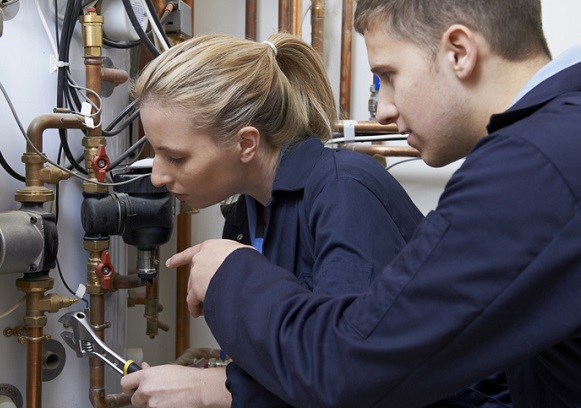Career Guide: How to Become a Plumber
Reading time: 5 minutes
What is a plumber?
Plumbing is a trade that is constantly in demand. Working in both commercial and domestic environments, plumbers are trained to install, repair and maintain plumbing systems in order to keep homes and businesses running efficiently.
A property’s plumbing system is complex too, so a plumber can find themselves working on a building’s water supply, heating system, sanitation unit or any of the fixtures tied to these.
What do plumbers do?
These are some of the tasks you can be expected to do during a typical day as a plumber:
-
Install, repair and maintain a property’s water, heating and drainage systems
-
Fit bathtubs, sinks and toilets into a property
-
Assess plumbing systems and then work on designs where required to ensure they follow all codes and regulations
-
Install heat pumps into a property
-
Solve issues related to blocked drains or broken boilers in an emergency
-
Service a building’s gas or oil-fired central heating system and radiators
-
Cut, shape, weld and join pipes, tubes and their fittings
-
Remove old copper piping and joints from a property and replace with recyclable components
-
Install weatherproof materials and flashing to a property’s walls, roof and chimney
-
Install fire sprinkler systems around a building
-
Repair and maintain plumbing tools and machines
Plumber job duties and responsibilities
There are various skills required to be a plumber, which includes the following:
-
Thorough knowledge about building and construction practices
-
Sound knowledge about all regulatory changes within the plumbing sector. This includes knowing about acceptable materials, safety regulations, spacing considerations, pipe size restrictions and aspects of drainage
-
Ability to read and interpret blueprints when planning for new installations into a property
-
Strong knowledge of mathematics
-
Ability to perform basic tasks on a handheld device or computer
-
Manual dexterity
-
Good physical health
-
Able to work at height
-
Attention to detail
-
Can use your own initiative
-
Proven ability to work well with others
-
Excellent customer service skills
Expected plumber salary
Are you wondering how much plumbers earn? The average salary for someone in this type of trade is set out as follows, according to Checkatrade research:
-
An apprentice plumber has an average salary in the region of £18,438 per year, which works out at approximately £15,936 of take-home pay.
-
A newly qualified plumber has an average salary in the region of £28,974 per year, which works out at approximately £23,351 of take-home pay.
-
An employed plumber has an average salary in the region of £45,760 per year, which works out at approximately £34,407 of take-home pay.
-
A sole trader plumber has an average salary in the region of £64,902 per year, which works out at approximately £46,244 of take-home pay.
-
A business owner of a Ltd company in the plumbing sector has an average salary in the region of £73,014 per year, which works out at approximately £48,509 of take-home pay.
Plumber apprenticeships and courses
There are a number of options available to becoming a qualified plumber, including undertaking an apprenticeship or completing a course.
A plumber apprenticeship
You will have the opportunity to work and earn a salary while studying by applying for a plumber apprenticeship.
Combining theoretical and practical training techniques, Level 3 Advanced Apprenticeships are available in the following areas tied to the plumbing sector:
-
Building Services Engineering Apprenticeship
-
Plumbing and Domestic Heating Technician Apprenticeship
-
Gas Engineering Operative Apprenticeship
-
Low Carbon Heating Technician Apprenticeship
It is important to note that five GCSEs at grades 9 to 4 (A* to C) or equivalent are usually required to apply for an advanced apprenticeship. These GCSEs need to include English and Mathematics.
A plumber college course
Another option to becoming a qualified plumber is to sign up to a college course.
Subjects which are available along this educational route include:
-
Plumbing and domestic heating
-
Plumbing studies
-
T Level in Building Services Engineering for Construction
The entry requirements for getting onto these courses do vary though, so it is best to enquire with the college which you are looking at.
However, a T Level does require four or five GCSEs at grades 9 to 4 (A* to C) or equivalent, which needs to include English and Mathematics.
A fast-track plumbing course and becoming a plumber’s assistant
Completing an accredited fast-track plumbing course is another way into this professional trade.
Usually lasting between eight and ten weeks, these courses will see students being set coursework by their tutors which will allow them to gain basic knowledge about general plumbing techniques and practices.
Some GCSEs, which need to include English and Mathematics, will usually be required to sign up to a fast-track course.
Once the fast-track course is completed though, successful students can become a plumber’s assistant. Also referred to as a plumber’s mate, this professional work position provides the opportunity to receive on-the-job training from an experienced plumber and earn a wage while learning the trade.
Your route into becoming a plumber should now be much clearer. Are you still undecided which type of professional tradesperson you would like to pursue though? To help further, we have helpful career guides focused on working as a builder, roofer, joiner and carpenter too.





